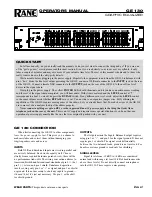
Video trouble
n
No video
l
Another input source is selected on the unit.
Select an appropriate input source with the input selection keys.
l
Another input source is selected on the TV.
Switch the TV input to display the video from the unit.
l
The video signal output from the unit is not supported by the TV.
Check the video output setting of the playback device. For information about video
signals supported by the TV, refer to the instruction manuals for the TV.
l
The cable connecting the unit and TV (or playback device) is defective.
If there is no problem with the connection, replace with another cable.
n
No video from the playback device connected to the
unit with HDMI
l
The input video signal (resolution) is not supported by the unit.
To check the information about the current video signal (resolution) and video
signals supported by the unit, see the following:
– “Checking information about the video/audio signals” (p.83)
– “HDMI signal compatibility” (p.150)
l
The TV does not support HDCP (High-bandwidth Digital Content Protection).
Refer to the instruction manuals for the TV and check the TV’s specifications.
l
The number of devices connected to the HDMI OUT jack is over the limit.
Disconnect some of the HDMI devices.
n
No image (contents required the HDCP 2.2/2.3 -
compatible HDMI device) from the playback device
l
The TV (HDMI input jack) does not support HDCP 2.2/2.3.
Connect the unit to the TV (HDMI input jack) that supports HDCP 2.2/2.3. (The
Warning message can be displayed on the TV screen.)
n
The menu of the unit is not displayed on the TV
l
The TV is not connected to the unit via HDMI.
You can display the menu of the unit on the TV only when they are connected with
an HDMI cable. If necessary, use an HDMI cable to connect them. For details, see
the following:
– “HDMI connection with a TV” (p.24)
l
Another input source is selected on the TV.
Switch the TV input to display the video from the unit (HDMI OUT jack).
En
126
















































